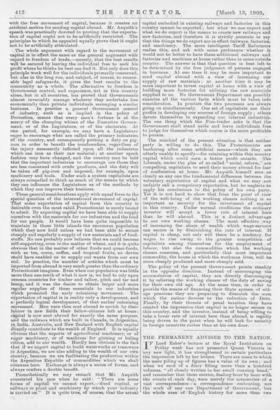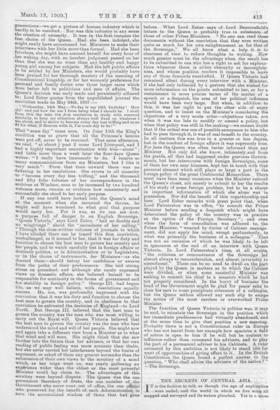THE PERMANENT ADVISER TO THE NATION.
IF Lord Esher's lecture at the Royal Institution on Friday Week has not presented Queen Victoria in any new light, it has strengthened in certain particulars the impression left by her letters. There are cases in which the mere piling up of figures has a value of its own ; and when we' read of a diary filling more than a hundred volumes, "all closely written in her small •running hand," and remember that these entries, dealing hour by hour with the events of. each' day, were merely the accessories' of a vast correspondence—a correspondence embracing, not the 'work of any one Department of Government, but the whole area of -English history for more than two generations—we get a picture of human industry which is hardly to be matched. Nor was.this industry in any sense the creation of necessity. It was in the•firet instance the free choice of the Queen. . Had she been indolent, she might easily have accustomed her Ministers to make their interviews with her little more than formal.. Had she been frivolous, she might have amused herself for every hour of her waking day, with no harsher judgment passed on her than that she was no wiser than anybealthy and happy young girl among her subjects. Had she left public affairs to be settled by .her Ministers, she would probably have 'been praised for her thorough mastery of the meaning of Constitutional kingship, or for her womanly preference for • personal and family duties over those larger cares which were better left to politicians and men of affairs. The Queen's decision was early made and persistently adhered to; Lord Esher quotes from the unpublished journal the resolution made on May 24th, 1837 :— "Wednesday, 24th May.—To-day is my 18th birthday ! How old ! and yet how far am I from being what I should be. I shall from this day take the firm resolution to study with renewed assiduity, to keep my attention always well fixed on whatever I am about, and to strive to become every day less trifling and more fit for what, if Heaven wills it, I'm some day to be !"
' That "some day" came soon. On June 15th the King's condition was so grave that all the Princess's lessons were put off, never to be resumed. That same afternoon, we read, "at about past 2 came Lord Liverpool, and I had a highly important conversation with him—alone" ; • and little more than a week later the four-days Queen writes: "I really have immensely to • do. I receive 'so -:many communications from my Ministers, but I like it • very much." , 'From that time onward there • was no =faltering in her resolutions. She strove in all sincerity: to "become every day less trifling," and the thousand and fifty folio volumes of her correspondence in the archives at Windsor, soon to be increased by two hundred volumes more, remain as evidence how consistently and successfully she stood to her early purpose. If any one could have looked into the Queen's mind. at • the moment when she mounted the throne, he might well have wondered to what goal that purpose' would carry her. For it was, as we can see now,!, purpose full of danger to an English Sovereigni "Queen Victoria," says Lord Esher, "had no doubts and no misgivings" about the "sacredness of her calling." "Through the close-written volumes of journals to 'which I have alluded there can be traced • this firm conviction,, unchallenged, as it seemed to her, that it was her duty and function to choose the best men to govern her country and her people, and to watch carefully lest in foreign affairs or domestic politics, or in Administration or in legislature, or in the choice of instruments, her Ministers—as she deemed them—should betray her confidence or swerve from the paths of their predecessors. She laid strong stress on precedent, and although she rarely expressed views on domestic affairs, she believed herself to be responsible for continuity in the forms of government and for, •stability in foreign policy." George III.. had begun life, • as we may well believe, with resolutions equally sincere. He, too, was profoundly impressed with the conviction that it was his duty and function to choose the • best men to govern the country, and in obedience to that conviction he entrusted the destinies of England—to Lord North. But George III. believed that the best man to govern the country was the man who was most willing to carry out• the Royal will. Queen Victoria believed that the best man to govern the country was the man who best understood the mind and will of her people. She might now and again take a different view from a Minister as to what that mind and will were. She might think that she saw further into the future than her advisers, or that her own reading of public feeling was more accurate than theirs, but she never carried her interference beyond the limits of argument, or asked of.them any greater surrender them the • submission of their own views to the scrutiny of a mind which, as her reign went on, was yearly gathering an experience wider than the oldest or the most powerful Minister could lay claim to. The advantages of this scrutiny, were beyond dispute. , The Queen was the one permanent Secretary ..of State, the one member of. the Government who never went out of office, the one official who preserved for the benefit of. each Administration in turn the accumulated wisdom of those that bad gone before. What Lord ,Esher says, of .Lord Beaconsfield?s letters to the Queen is probably true in substance. of those of other Prime Ministers. , " No one can read these documents without the conviction that they were written quite as much for his own enlightenment as for that of the Sovereign." We all know what a help it is to clearness of view to reduce thoughts to writing. Hew much greater must be the advantage when the result has to be submitted to one who has a right to ask for explana- tions whenever there is either obscurity or incomplete- ness, and whose position renders it impossible to leave any of those demands unsatisfied. If Queen Victoria had remained silent during every interview with a Minister, if she bad only indicated by a gesture that she wished for more information on the points submitted to her, or for a. restatement in more precise terms of the matter of a speech or a despatch, the area of her political influence would have been very large. But when, in addition to this, it was her right to put the other side of every question, and to insist on the Minister's considering the objections of a very acute critic—objections taken, not when it was too late to modify or amend a policy, but when that policy was still in them:taking—we cannot doubt that if the ordeal was one of possible annoyance to him who had to pass through it, it was of real benefit to the country. In all matters this was true in a greater or less degree, but in the conduct of foreign affairs it was supremely true. For here the Queen was often better informed than any Minister Not only did she know, intimately and from the juside, all that had happened under previous Gov:ali- ments, but her‘intercourse with foreign Sovereigns, souse of them her own near kinsmen, kept her in touch with that personal element which still plays so large a part in the foreign policy of the great Continental Monarchies.., The must have been many occasions when the Minister entered the Queen's closet, not merely to submit to her the results of his study of some foreign problem, but to be ,a sharer in important information of which she alope was in possession. Nor did the benefit of this copartnership end here. Lord Esher remarks with great point that, when Lord Palmerston was in office, "to consult the Prime Minister before sending a despatch which might have determined the policy of the conntry was in practioe at the Option of the Foreign Secretary," ; and thin when the form • of consultation was adhered to, the Prime Minister, "wearied by duties of Cabinet manage- ment, . did not apply his mind, except perfunctorily, to what was primarily the business of a colleague." • That was not an omission of which he was .likely to be left in ignorance at the end of an interview with Queen Victoria, In Lord Palmerston's time, at . all eveuts, "the criticism or remonstrance of the Sovereign led almost always to reconsideration, and almost invariably, to amendment." There can be no need to dwell on the part played by the Queen in matters as to which the Cabinet were divided, or when some masterful, Minister was seeking to commit his chief to a measure' whiaChe had not properly considered. In the hurry. Ot business the head of the Government might be glad for peace' sake to close his ears to some precipitate Utterance of a colleague, but the . Queen seldom allowed any such slip to escape the , notice of the most careless or overworked Prime Minister.
• The function of Queen Victoria in polities was, it may be said, to reinstate the Sovereign in the position which her immediate predecessors had virtually abandoned,' and. at the same time to give that position a new meaning. Probably there is not a Constitutional ruler in Europe • who has not learnt from her example how Spacidus a field of action is open to him if he will but be content to influence rather than command his advisers, and to play the part of a permanent adviser to his Cabinets. A relax animated by this ambition is not likely to stand idle for want of opportuuities of giving effect to it., In the British Constitution, the Queen found a perfect answer to the question, " Who shall advise the advisers of the nation.? —The Sovereign.







































 Previous page
Previous page